You discover what it is like to be hungry. With bread and margarine in your belly, you go out and look into the shop windows. Everywhere there is food insulting you in huge, wasteful piles; whole dead pigs, baskets of hot loaves, great yellow blocks of butter, strings of sausages, mountains of potatoes, vast Gruyere cheeses like grindstones... You discover that a man who has gone even a week on bread and margarine is not a man any longer, only a belly with a few accessory organs... Have you noticed how bread tastes when you have been hungry for a long time? Cold, wet, doughy—like putty almost. (George Orwell, 1933, Down and Out in Paris and London)
The budget traveller's hotel breakfast doesn't change much from London to Paris - except in the freshness and shape of the bread served. No need to tell you which photograph represents which city.
... men... slightly underfed, but kept going by the tea-and-two-slices which the Londoner swallows every two hours... his cheeks had lanked and had that greyish, dirty in the grain look that comes of a bread and margarine diet... two years of bread and margarine had lowered his standards hopelessly. He had lived on this filthy imitation of food till his own mind and body were compounded of inferior stuff. It was malnutrition and not any native vice that had destroyed his manhood... Food, to him, had come to mean simply bread and margarine—the eternal tea-and-two-slices, which will cheat hunger for an hour or two... a ration which is probably not even meant to be sufficient... The result is that nearly every tramp is rotted by malnutrition; for proof of which one need only look at the men lining up outside any casual ward. (George Orwell, 1933, Down and Out in Paris and London)
Freshly
baked bread and olive oil make a hearty Greek snack any time of the
day. My kids like this kind of snack in the evening. They toast thick
country-style bread and pour olive oil over it, sprinkled with a little
oregano and a little lemon juice. The bread is dense, crunchy on the
outside, soft inside. This kind of bread meal probably won't be
considered cheap in Northern European
countries, where freshly baked bread is regarded as a 'gourmet',
'artisanal'
product and olive oil is an expensive import. Pre-sliced bread is
unsuitable for this kind of snack.
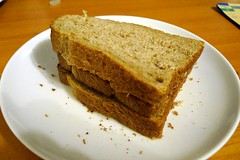 Bread and oil are considered staples in Greece, but not in the same form as presented in the bread-and-marg meal: in Greece, spongey square mass-produced slices of bread are only considered edible in the form of a toasted sandwich filled with ham and cheese (at the very least). If this were ever to be presented to someone in Greece with the ham and cheese replaced by bread (and I wouldn't want to be the one to do it), the recipient would probably (and rightly) think of their host as completely lacking in social graces. Even the poorest Greeks right at this moment would laugh at the thought of such food being dubbed a meal. Moreover, Greeks do not resort to other commonly regarded cheap meals in the UK, such as tinned baked beans (~12p per 200g serving) or Chinese bowl noodles (~11p per packet). Again, these cost (much)
more to buy in Greece, because, like the sliced-bread lunch, such convenience
food has never been regarded as a real meal. (I bet many/most Greeks
wouldn't know what to do with the tin/packet int he first place.) In the
Greek price comparison sites, they aren't even listed, which shows that they aren't considered a common shopping item in Greece.
Bread and oil are considered staples in Greece, but not in the same form as presented in the bread-and-marg meal: in Greece, spongey square mass-produced slices of bread are only considered edible in the form of a toasted sandwich filled with ham and cheese (at the very least). If this were ever to be presented to someone in Greece with the ham and cheese replaced by bread (and I wouldn't want to be the one to do it), the recipient would probably (and rightly) think of their host as completely lacking in social graces. Even the poorest Greeks right at this moment would laugh at the thought of such food being dubbed a meal. Moreover, Greeks do not resort to other commonly regarded cheap meals in the UK, such as tinned baked beans (~12p per 200g serving) or Chinese bowl noodles (~11p per packet). Again, these cost (much)
more to buy in Greece, because, like the sliced-bread lunch, such convenience
food has never been regarded as a real meal. (I bet many/most Greeks
wouldn't know what to do with the tin/packet int he first place.) In the
Greek price comparison sites, they aren't even listed, which shows that they aren't considered a common shopping item in Greece.

Above: Frugal meals in our house are very common because they make use of whatever is growing in the garden, which is what a lot of our meals are based on, supplemented by cheap store-bought carbohydrates like pasta and rice. Rice parcels can be made throughout the year with different seasonal leaves and herbs. Right: summer - zucchini flowers, vine leaves and tomatoes. Left: winter - squash flowers, wild-growing sorrel and chinese leaves from our garden (the seeds were a present from a friend). Nothing is truly 'free', but it can be considered as very economical.
Below: Lemon-cured olives collected from local trees, garden-fresh radishes and roasted peppers in olive oil, slow-roasted pork (the cheapest meat on the Greek market - Greeks generally eat less meat now) with freshly harvested potatoes from a friend's garden - a typical Sunday meat meal in our house. It is both frugal and sumptuous.
Below: Lemon-cured olives collected from local trees, garden-fresh radishes and roasted peppers in olive oil, slow-roasted pork (the cheapest meat on the Greek market - Greeks generally eat less meat now) with freshly harvested potatoes from a friend's garden - a typical Sunday meat meal in our house. It is both frugal and sumptuous.



Despite Asian fare being considered the cheapest kind of restaurant meal in other European countries, in Greece, this kind of meal costs much more than a cheap taverna meal. But with the abundance of fresh ingredients available to the rural Cretan, even international cuisine can become standard fare at a miminum cost. Left: onion bhaji, garden-fresh sauteed chinese leaves (the seeds were a treasured present from a friend) with Greek cured meat (lountza - a kind of Greek bacon: a little goes a long way), and eggplant fried rice. Right: boiled rice, stir-fry chicken with black beans, and sauteed chinese leaves. Frugal daily
meals consist of some kind of bean dish twice a week - but it's only
cooked once: the second time we eat it, it will be a leftover from the
same cooking session. Frugal meals mean being economical from many
aspects: money, energy and time all count.
Greeks now earn less money and are required to pay more special taxes, often with little warning given, under the threat of having the power disconnected if they don't cough up. What we often took for granted has now come under heavy scrutiny. In the past, fruit fell off the trees and onto the ground - this rarely happens now (it's harvested before it falls). The four most oft-discussed topics we hear being talked about concern what heating fuel we use (this one tops the list), which system heats our water supply (ie do we have solar panels, and is our water heater connected to the central heating system), what's growing in our garden these days and whether the latest tax bill has come yet.

Heating fuel has now become very expensive, so most people in Hania are now investing in fireplaces or indoor wood-burning ovens/heaters. This is our pile of firewood - the heater will be purchased soon.


A meal out is definitely out for now (pun not intended) - when we eat 'out', it's
usually a cheap and tasty souvlaki every now and then: YA! near the Hania town hall sells them at 2 euro per pork gyro and 2.20
euro for chicken, beef or kebab.
Πενία τέχνας κατεργάζεται: "the need for survival (ie hunger) creates ways of survival", the Greek form of the proverb 'make, do and mend'.
**"Food is the least of our worries."
***"Others are hungry - we're fine here."
*** *** ***
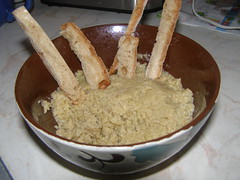
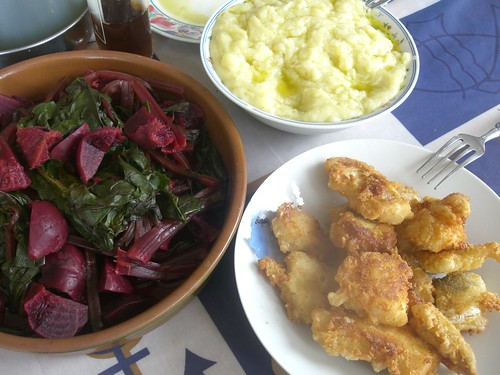 Stale bread is never thrown out in our house (and probably not in other Greeks' houses now, either). Apart from warming it up (it softens this way) and spreading it with oil or butter, it is used in the mixture for biftekia (meat patties) and skordalia, a garlicky dip. The
crusts are removed from stale slices of traditional bakery bread (it
can be made with stale mass-produced bread too), which are
soaked just a little so as to soften them and make them easy to blend
with garlic, salt, vinegar and oil. I used a mixed-grain bread to make mine (pictured, above right), and left the crusts for dipping. This cheap and frugal bread dish is simple to make, and forms a staple part of a lenten meal, especially on Palm Sunday. The dip can also be made with boiled potato (pictured, above left) when there's no stale bread at hand.
Stale bread is never thrown out in our house (and probably not in other Greeks' houses now, either). Apart from warming it up (it softens this way) and spreading it with oil or butter, it is used in the mixture for biftekia (meat patties) and skordalia, a garlicky dip. The
crusts are removed from stale slices of traditional bakery bread (it
can be made with stale mass-produced bread too), which are
soaked just a little so as to soften them and make them easy to blend
with garlic, salt, vinegar and oil. I used a mixed-grain bread to make mine (pictured, above right), and left the crusts for dipping. This cheap and frugal bread dish is simple to make, and forms a staple part of a lenten meal, especially on Palm Sunday. The dip can also be made with boiled potato (pictured, above left) when there's no stale bread at hand.
It
may sound like the Greeks are eating bread with bread in this way - but
again, skorthalia is never served on its own: in fact, it's
traditionally accompanied by boiled beetroot and fried fish. It's all a matter of identity, not just a case of a more refined cuisine: you eat what you are.
©All Rights Reserved/Organically cooked. No part of this blog may be reproduced and/or copied by any means without prior consent from Maria Verivaki.
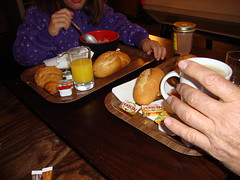
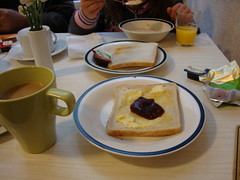
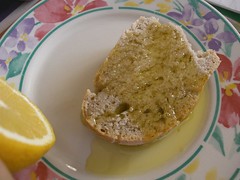

The Orwell book sounds like an interesting read.
ReplyDeleteStale bread is never thrown in our household either. I even make a pie with it :)
Can we see the picture of the fireplace, once finished?
I hope to have one myself some day, I love them.
I think it's better to be poor in Greece than in the UK. At least fresh fruits and vegetables provide better nutrition than processed carbs. You need less heating because of the better climate and in the summer the beach is free and open to anyone.
ReplyDelete